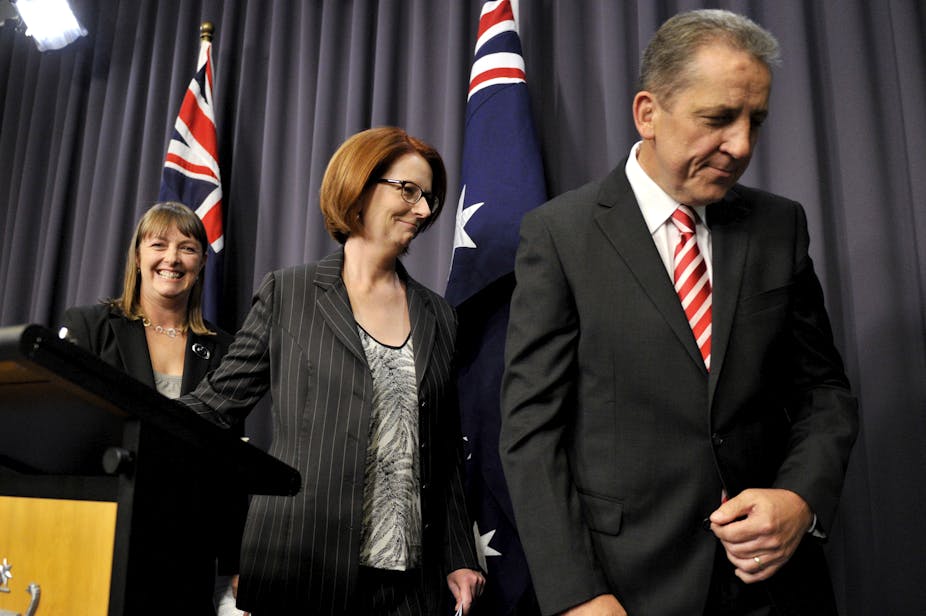Much of the commentary surrounding the resignations of Nicola Roxon and Chris Evans has interpreted the departures as yet another episode in the neverending disaster that is the Rudd-Gillard government.
This is Tony Abbott’s “constant crisis” narrative. As government MPs have been at pains to point out, not just this week but this term, the government has been nothing if not stable and will likely run full term, or close to it.
Talk of “crisis” seems hyperbolic. There has, however, been a consistent sense that the government is teetering on the brink. It’s a sense which can largely be put down to the inevitably precarious appearance of minority government, especially when voters and commentators have had few experiences of it, at least at the national level.
Abbott’s crisis narrative has been actively encouraged by business groups and right-wing media particularly hostile to minority government. The common charge from the self-interested corporates is that minority government forces too much “uncertainty” into the system. Not for them parliamentary democracy, it seems.
Given that Labor and Liberal party polices are rarely radically divergent these days, it’s difficult to know what business means by “uncertainty”. It seems likely that minority government has given business just enough rationalisation to go to war on its natural enemy – Labor – despite remaining uneasy about Abbott’s capacities.
Even as the government has strenuously denied accusations of crisis, at least since the alleged source of the crisis, Kevin Rudd, was eliminated (twice), the government has done its best to otherwise feed into the narrative with its own occasionally bizarre behaviour.
An obsessive focus on Abbott has led the government more than once into making reactive decisions, motivated by the need to neutralise the threat. To observers such a focus has been odd, given that Abbott has done little other than bandy about negative slogans.
But from the moment it backed away from its carbon emissions reduction commitment in response to some negative populism from the new Opposition leader, the ALP has lurched from one panicked reaction to another.
It worried about Abbott’s appearance among crazies at a carbon tax rally. It tried to out-flank Turn-Back-the-Boats Tony on the right with its Pacific Solution Ultra, first by negotiating an unenforceable people-swap with Malaysia and then by making traumatised people not convicted or charged with any crime languish indefinitely on remote Pacific islands. It even decided to announce the election date early in a weird attempt to neutralise Abbott’s campaigning and shift the focus back to “policy”.
Julia Gillard’s early announcement of this year’s election date seemed to highlight the government’s dysfunctional internal consultative processes. That was the rationale given for Rudd’s elimination. The question left hanging in the air then was how the Labor party had been hollowed out to the point that one person was left with the capacity to mess up internal processes in the first place.

Complete with new glasses eerily similar to Rudd’s, Gillard is now being tarred with a similar brush: she did not exactly bring her party with her on her recent decisions to announce the election date six months early and to draft in Nova Peris as the party’s Senate candidate in the Northern Territory. That decision should have been applauded as a commendable instance of affirmative action. That it was not is surely evidence of the lack of respect Gillard has within the party. John Howard made executive decisions all the time, but his team took those decisions on faith. Labor has not been prepared to do that for either of its leaders.
Speculation about Roxon and Evans’ resignations is natural, especially given the circumstances surrounding previous high-profile exits. Lindsay Tanner, it seems, became so disgusted with internal dysfunction that he made a swift departure, wrote one book projecting ALP dysfunction onto the media’s 24-hour “news cycle”, and then wrote the book he should have written the first time, complaining of the lack of fundamental purpose behind much of the government’s activity.
Indeed, far more damaging to the government as we kick off this election year is Craig Thomson’s continuing presence in the media for all the wrong reasons, and Eddie Obeid’s appearance at a NSW corruption inquiry. It’s difficult to escape the conclusion that this is the sort of thing that happens when a social democratic party trades away most of its social democracy for the ideology of its opponents – free-market capitalism – and then attracts and rewards highly ambitious numbers-men.
This government enters its second re-election year justifiably proud that it has defeated Abbott’s attempts to bring the house down with his brand of vacuous populism that trades on fear and uncertainty. But what of the once sparkling white, red and blue hopes of Kevin07 tshirt wearers, now faded to a dull neo-liberal grey?
The hopes of Kevin 07 were largely those of a competent, social-democratic government which would change the conversations of John Howard’s Australia, and invoke pride in a nation of good global citizens.
The Labor party’s structure since the 1980s has not allowed for the promotion of men and women able to run such a government. When a party is struggling to articulate its purpose, it’s no wonder some of its key agents run out of puff early.

